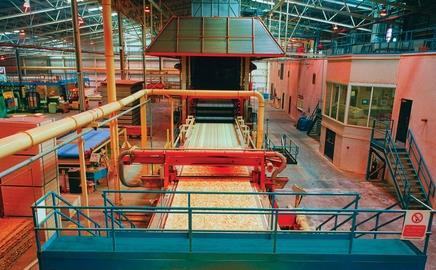Norbord is a manufacturer of wood-based panels and the world’s second-largest producer of oriented strand board (OSB).
The Toronto-based company has a net turnover of £700m a year and a worldwide workforce of 2,700, of which 1,000 are based in Europe. Dave McElroy, Norbord’s deputy managing director for the commercial division, reveals how this Canadian is doing in the UK.
Describe your position in the British market
We’re the UK’s largest manufacturer of wood-based panels and its largest consumer of raw wood. We have a consolidated spread of products between OSB, particle-based products and MDF – we’re the only UK manufacturer that has all three.
Who do you sell your products to?
We sell to four sectors – national builders merchants, industry, DIY and the distribution market. We have a good mix of customers in all sectors, although in the UK we sell two-thirds of our production to our top seven customers. We have very strong links with the national homebuilders through our chosen distributors.
What makes your company stand out from its competitors?
We see our core competencies as our broad product range, our very strong blue-chip customer base and our service excellence – we’re the only company in the UK that offers leading builders merchants 48-hour service of all three major product lines. Also, we’re a pretty strong company financially and we’re customer friendly. We work quite closely with our customers and with builders on product development.
How does the UK market differ from others?
Compared with North America and Europe, it is much more heavily weighted to brick and block.
We spend a lot of energy supporting timber-frame construction. Although its use is growing in the UK it’s not fast enough for us, so we’re doing what we can to support the UK Timber Frame Association and those of our customers looking to build with wood.
What are your most popular products and why?
In particle-board flooring, Caberdeck has had enormous growth over the past five years and we expect that to continue. It’s a site-friendly product – you lay it and when all the work is done, there is a protective cover that you peel off to reveal a clean floor.
OSB for timber housing is growing rapidly, too. OSB roof deck, an environment-friendly and cost-effective alternative to plywood, is catching on. It’s certified by the Forest Stewardship Council and the British Board of Agrément. The other advantage of locally made OSB over imported plywood is that it’s always available.
What has had the biggest effect on your business lately?
Over the past couple of years, it has been cost increases. We have five basic costs – resin, wood, energy, people and transport.
On the first three we’ve had massive cost increases – it’s a worldwide phenomenon. So that has been the biggest single challenge in the past couple of years. Costs don’t go up for ever but we are operating from a new level now.
How about looking to the future?
The exciting thing going forward is that we’re the good guys on the environmental front, so we see the future as fairly robust. The massive discussions between government, industry and the environmental movement on zero-carbon imprints and building more housing all works in favour of building with wood. So we’re doing what we can to support that.
A major challenge for the industry is the availability of land for building, but there are signs that it’s making it to the top of a lot of agendas.
Topics

Specifier 21 September 2007
- 1
- 2
- 3
- 4
- 5
- 6
- 7
 Currently
reading
Currently
reading
Norbord: Panel beaters
- 9
- 10
- 11
- 12
- 13
- 14


































No comments yet